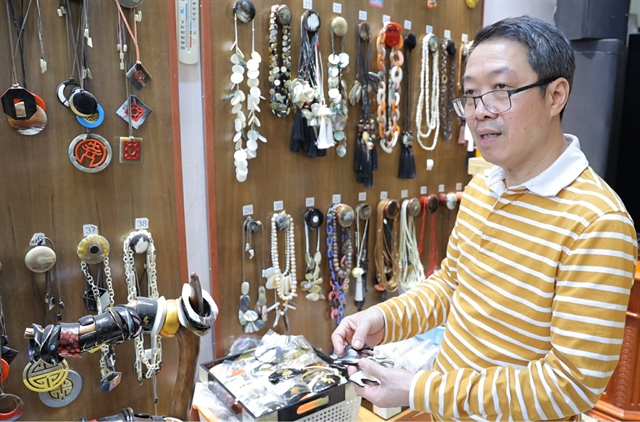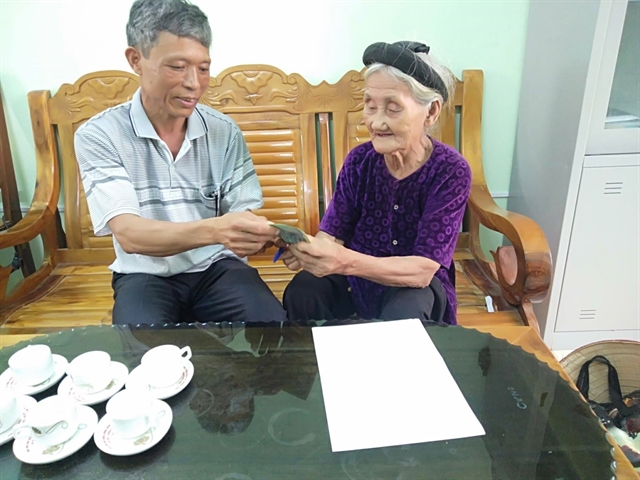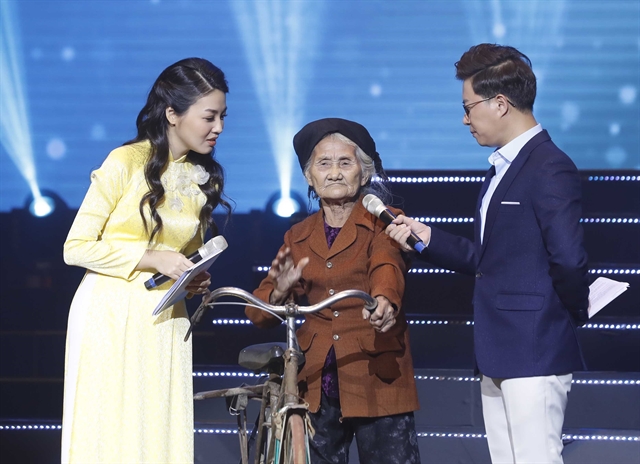 Society
Society

The 84-year-old Đỗ Thị Mơ of Thường Xuân District in the central province of Thanh Hoá has become known across Việt Nam after she asked local authorities not to classify her household as 'poor' in September last year.

|
| In early April this year, 84-year-old Đỗ Thị Mơ donates her life’s saving worth VNĐ 2 million after watching Prime Minister Nguyễn Xuân Phúc’s televised message calling on every Vietnamese citizen and resident to join hands in the nation’s fight against the COVID-19 pandemic. —VNA/VNS Photo |
HÀ NỘI — The 84-year-old Đỗ Thị Mơ of Thường Xuân District in the central province of Thanh Hoá has become known across Việt Nam after she asked local authorities not to classify her household as 'poor' in September last year, effectively forgoing many benefits and preferentrial treatment.
The octogenarian lives alone in a small house with an area of about 30 sq.m in Lương Thiện Hamlet, Lương Sơn Commune, saying she did not want to rely on or bother any of her 11 children, as she still has her health.
Mơ makes a living by growing vegetables, raises chickens and taking her produce to sell at a local market.
With her income, she could live well and had enough food to eat so she thought she was no longer poor, Mơ said.
In 2018, for the first time, she asked the local authority to no longer include her in the local list of impoverished households.
In Việt Nam, a household is considered poor if it has a monthly per capita income of VNĐ700,000 ($30) or lower, or up to VNĐ1 million ($42) if it lacks access to three out of five basic social services including health care, education, housing, clean water and hygiene, and information, according to a 2015 decision.
Poor households are eligible for financial and housing support as well as low-interest loans to invest in their livelihoods, among other forms of support provided by the Government to lift them out of poverty.
Last year, for the second time, Mơ applied for her household to be rid of the poor status, saying there are people out there who are “in more dire need” of Government support.
A video of Mơ riding a bicycle to the office of Lương Sơn Commune and giving officials her request went viral in September last year. Netizens applauded the elderly woman who redeemed their faith in people, especially after many reports of those who falsified their poverty status to illicitly obtain Government support.
In early April this year when Việt Nam was in the thick of the fight against COVID-19, Mơ donated her life’s savings of VNĐ2 million after watching Prime Minister Nguyễn Xuân Phúc’s televised message calling on every Vietnamese citizen and resident to join hands in the nation’s fight against the COVID-19 pandemic.
Inspired by Mơ’s actions, thousands of people from poor and near-poor households across the country forewent Government support and offered it to those more in need.
In October last year, Mơ was awarded a certificate of merit from Thanh Hoá Province People’s Committee for setting a good example in the fight against poverty.
She was a special guest in a programme hosted by VTV on October 17, 2019, that called for support to the poor.
Last month, Mơ was among more than 300 outstanding individuals in Thanh Hoá Province that received certificates of merit from the province for contributions in the patriotic emulation movement in the last five years.

|
| Đỗ Thị Mơ interviewed on a TV programme. — VNA/VNS Photo |
No poor any more
At the age of 84, Mơ still farms and lives by herself.
To may people’s surprise, Mơ said she is capable of cleaning her fishing pond on her own without help.
“I can still do it. Why do I have to ask for help?” Mơ said.
“Since I became famous thanks to the video, many people and organisers have visited me, which makes me so happy,” she said, adding that their encouragement made her feel "healthier" too.
“I didn't think my simple action would matter to people as much as that. I simply don’t want to be labelled a 'poor household' because I can still work and earn money,” she said.
Mơ was born and grew up in a poor family in the rural district of Quảng Xương in Thanh Hoá. She joined the militia force, serving in Điện Biên Province in the north. She married a soldier when she was 24. Then, the couple volunteered to move to the mountainous area of Lương Sơn District, Thanh Hoá Province and started farming there.
Mơ’s husband died of illness more than 30 years ago, leaving Mơ to raise their 11 children, one of whom is adopted. Now, two of her 11 children have died while others have their own families and stable incomes.
“I don’t want to live together with any of my children not because I am a hard nut to crack or my children ignore me,” she said, adding that she felt healthy enough to live alone.
Lương Xuân Thiêm, chairman of Lương Sơn Commune People’s Committee, said local authorities and people always found Mơ a person of work.
“She has kept working all the time. She has not allowed herself to rely on others’ support,” he said.
Secretary of Thanh Hoá Province Party Committee and chairman of the province People’s Council Trịnh Văn Chiến at a council meeting retold Mơ’s story, asking local officials to make her an example to follow.
“Think and do for those who are more disadvantaged,” Chiến said.
The official said he was so unhappy to learn that in some cases, fabricated documents were made so that well-off households, including those of officials and their relatives, could be classified as poor or near-poor households and get Government support.
Such violations were so shameful and the difference that Mơ made would rouse the conscience of such selfish violators, he said. — VNS